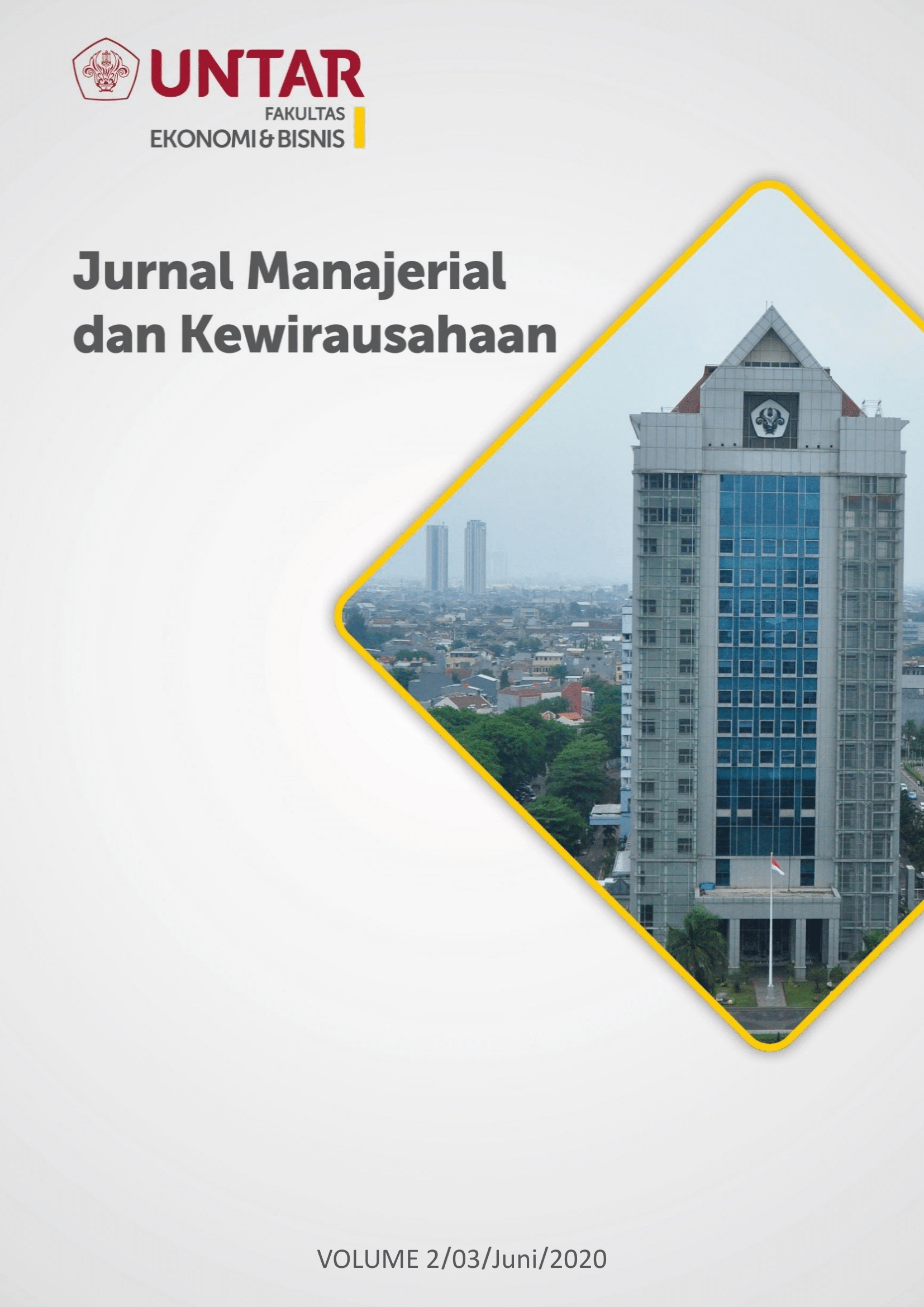Kesenangan Hedonis terhadap Keterlibatan Pelanggan, Mediasi: Kepercayaan Merek dan Kecintaan Merek
Main Article Content
Abstract
The purpose of the study is to test whether the hedonic pleasure can affect customer engagement with brand trust and brand love as mediation. The population of this research is Oppo’s smartphone users who residen in West Jakarta, of the entire population researchers only use 100 people in the sample chosen using convinience sampling methods, by handing out a questionnaire online the data is processed using smartPLS-SEM. The result of this research is a hedonic pleasure and brand love might affect customers engagement, the brand trust can’t affect the customer engagement and can’t be mediation of the hedonic pleasure against customers engagement, while the brand love capable of being mediation of hedonic pleasure and brand trust of the customer engagement.
Tujuan dari penelitian ini adalah untuk menguji apakah kesenangan hedonis dapat mempengaruhi keterlibatan pelanggan melalui kepercayaan merek dan kecintaan merek sebagai mediasi. Populasi dari penelitian ini adalah pengguna smartphone Oppo yang berdomisili di Jakarta Barat, dari seluruh populasi peneliti hanya menggunakan 100 orang sebagai sampel yang dipilih menggunakan metode convinience sampling, dengan menyebarkan kuesioner secara online data kemudian diolah menggunakan smartPLS-SEM. Hasil dari penelitian ini adalah kesenangan hedonis dan kecintaan merek dapat mempengaruhi keterlibatan pelanggan, kepercayaan merek tidak dapat mempengaruhi keterlibatan pelanggan dan tidak dapat menjadi mediasi kesenangan hedonis terhadap keterlibatan pelanggan, sedangkan kecintaan merek mampu memediasi kesenangan hedonis dan kepercayaan merek terhadap keterlibatan pelanggan.
Article Details
Section
This work is licensed under a Jurnal Muara Ilmu Ekonomi dan Bisnis Creative Commons Attribution-ShareAlike 4.0 International License.,/p>
References
Abror, Fikri Ikhsan, and Yasri. (2018). The Impact of Brand Experience and Brand Trust on Brand Engagement: The Mediating Effect of Brand Satisfaction. Advances in Economics, Business and Management Research, (57) 1-9.
Bourlakis, Papagiannidis, Pantano, and See-To. (2013). Modelling the determinants of a simulated experience in a virtual retail store and users’ product purchasing intention. Journal of Marketing Management, (29) 13–14, 1462–1492.
Bravo, Martinez, and Pina. (2019). Effects of customer perceptions in multichannel retail banking. International Journal of Bank Marketing, (37) 5, 1253-1274.
Carroll, B. A. and Ahuvia, A. C. (2006). Some antecedents and outcomes of brand love. Marketing Letters, (17) 2, 79-89.
Chaudhuri, A. and Holbrook. (2011). The chain of effects from brand trust and brand affect to brand performance: The Role of Brand Loyalty. Journal of Marketing, 65(2), 81.
Chen and Hsu. (2018). How gamification marketing activities motivate desirable consumer behaviors: Focusing on the role of brand love. Computers in Human Behavior, 88, 121–133.
Dash and Cyr. (2014). Linking user experience and consumer-based brand equity: the moderating role of consumer expertise and lifestyle. Journal of Product & Brand Management, 23/4/5, 333–348.
Enrique P. Becerra and Vishag Badrinarayanan. (2013). The influence of brand trust and brand identification on brand evangelism. Journal of Product & Brand Management, 22/5/6, 371–383.
Flynn. L. (2012). An Exploration of Engagement: A Customer Perspective. Dissertation. DePaul University. Chicago.
Gultekin and Turgut. (2015). The Critical Role Of Brand Love In Clothing Brands. Journal of Business, Economics & Finance, (4), 126-152.
Hirchman, E. C., and Holbrook, M. B. (1982). Hedonic Consumption: Emerging Concepts, Methods and Propositions. Journal of Marketing, (46), 92-101.
Hopkinson, G.C., and Pujari, D. (1999). A Factor Analytic Study of The Sources of Meaning in Hedonic Consumption. European Journal of Marketing, (33) 4.
Hur, Kang, and Kim. (2015). The moderating role of Hofstede’s cultural dimensions in the customer-brand relationship in China and India. Cross Cultural Management, (22) 3, 487-508.
Junaid, Hou, Hussain, and Kirmani. (2018). Brand love: the emotional bridge between experience and engagement, generation-Mperspective. Journal of Product & Brand Management, (28) 2, 200–215.
Kantabutra and Winit. (2017). Sustaining Thai SME through perceived benefits and happiness. Management Research Review, (40) 5, 556-577.
Karjaluoto, Munukka, and Kiuru. (2016). Brand love and positive word of mouth: the moderating effects of experience and price. Journal of Product & Brand Management, (25) 6, 527–537.
Kirgiz. (2014). Hedonism, A Consumer Disease Of The Modern Age: Gender And Hedonic Shopping In Turkey. Global Media Journal: TR Edition 4 (8).
Kotler, Philip dan Kevin Lane Keller. (2009). Alih Bahasa: Benyamin Molan. Manajemen Pemasaran. Edisi Ketigabelas. Jilid 1 dan 2. Cetakan Keempat. PT. Indeks. Jakarta.
Lau, Geok Theng and Lee, Sook Han. (1999). Consumers Trust in a Brand and the Link to Brand Loyalty. Journal of Market Focused Management, (4), 341-370.
Leong, Osman, Paim and Fazli. (2019). Enhancing Consumer Online Engagement Through Consumer Involvement: A Case Of Airline And Hospitality Services In Malaysia. Management Science Letters (9) 795–808.
Parihar, Dawra, and Sahay. (2019). The role of customer engagement in the involvement-loyalty link. Marketing Intelligence & Planning, (37) 1, 66-79.
Patterson, P., Yu T., and de Ruyter K. (2006). Understanding customer engagement in service: Advancing Theory, Maintaining Relevance, Proceedings of ANZMAC Conference.
Peter Clarke and Andrew McAuley. (2010). Parental evaluation of popular brand names given as Christmas gifts and sources of information used in these decisions. Journal of Consumer Marketing, (27) 6, 534–542.
Rahman and Islam. (2016). Examining the effects of brand love and brand image on customer engagement: An empirical study of fashion apparel brands. Journal of Global fashion Marketing, (7) 1, 45–59.
Roberto. (2017). Drivers and Outcomes of Customer Brand Engagement on Online Social Media Based Tourism Brands. Dissertation. Universidade do Porto. Potugal.

